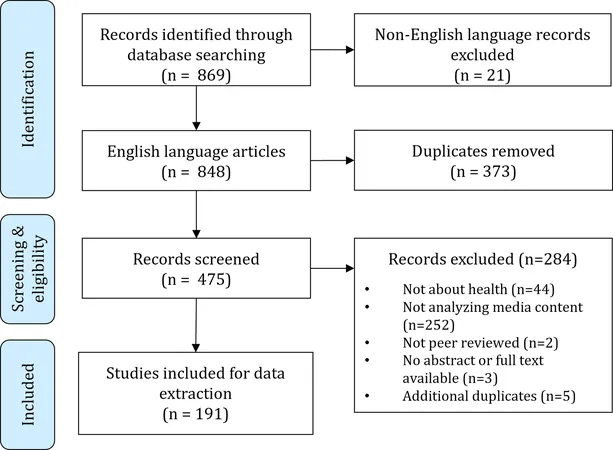
Unlocking the Power of Media Debates in Bioethics: What You Need to Know!
2025-07-04
Author: Olivia
The Crucial Intersection of Bioethics, Media, and Society
Bioethics doesn't just thrive in academic circles; it thrives in the heart of public debates—especially those sparked by media coverage on pressing health issues, from groundbreaking healthcare technologies to responses to health crises like pandemics. A thorough examination of media debates unveils three significant criteria: these discussions happen in both traditional and social media, they foster an exchange of opinions and moral arguments, and they must be accessible to the public.
Shaping Society: The Power of Public Discourse
In democratic societies, media debates play a pivotal role in shaping public discourse and political opinions. Traditional media and social platforms act as powerful forums where diverse viewpoints converge, impacting how people perceive and engage with bioethical issues. For instance, biases in media ownership can color the narrative, as seen during critical events like the COVID-19 pandemic, highlighting the necessity for responsible journalism to monitor societal elites and governmental actions.
Media Debates: The Practical Implications for Healthcare
The consequences of media debates ripple through the healthcare sector, influencing decisions made by professionals and policymakers. The discourse surrounding COVID-19 contact tracing apps, for example, shows how media portrayal can shape public acceptance and compliance with health measures. Analyzing these media discussions helps bioethicists glean insights into the factors influencing health practices.
Exploring Ethical Dimensions: Media’s Role in Moral Identification
Media is not just a mirror reflecting society; it also shapes the moral landscape. Through the lens of media debates, ethical dilemmas are often brought to light—whether it’s highlighting neglected issues or transforming the portrayal of vulnerable groups, as seen during the pandemic. Such analyses can reveal how media narratives can propagate harmful stereotypes or ethical oversights.
Ethics Through the Media: Understanding Societal Norms
Media analyses also offer a window into societal values and norms by revealing the predominant moral convictions that shape public debates. For example, discussions around climate change often reveal conflicts between various moral frameworks. Understanding how these values are represented—or missed entirely—can guide future ethical discourse in bioethics.
The Evolving Landscape of Bioethical Research
Recent trends show an uptick in scholarly work analyzing health-related media debates, diverse in methodology and focus. Our rapid scoping review pointed to increased interdisciplinary interest, with methodologies ranging from qualitative and quantitative analyses to cutting-edge machine learning techniques.
Future Directions: Methodology Meets Meaning in Media Analysis
To advance the conversation, researchers should embrace robust methodologies that consider broader public arenas, such as policy discussions and NGO communications. The incorporation of sophisticated digital content analysis tools can further enhance capabilities, pushing the boundaries of how we interpret and engage with bioethical debates.
The Challenge Ahead: Bridging Empirical and Ethical Insights
As we move forward, the challenge lies in intertwining empirical observations from media analyses with normative ethical arguments. A keen understanding of the societal structures behind media content is crucial to ensure bioethics remains relevant and impactful in real-world scenarios.
Conclusion: Engage, Analyze, Transform
The analysis of media debates holds immense potential for enriching bioethical discussions. By embracing these intersections and exploring the implications of public discourse, bioethics can drive change, influence policy, and empower society. It’s time to unlock this power and transform how we navigate the ethical landscapes of health and society!









 Brasil (PT)
Brasil (PT)
 Canada (EN)
Canada (EN)
 Chile (ES)
Chile (ES)
 Česko (CS)
Česko (CS)
 대한민국 (KO)
대한민국 (KO)
 España (ES)
España (ES)
 France (FR)
France (FR)
 Hong Kong (EN)
Hong Kong (EN)
 Italia (IT)
Italia (IT)
 日本 (JA)
日本 (JA)
 Magyarország (HU)
Magyarország (HU)
 Norge (NO)
Norge (NO)
 Polska (PL)
Polska (PL)
 Schweiz (DE)
Schweiz (DE)
 Singapore (EN)
Singapore (EN)
 Sverige (SV)
Sverige (SV)
 Suomi (FI)
Suomi (FI)
 Türkiye (TR)
Türkiye (TR)
 الإمارات العربية المتحدة (AR)
الإمارات العربية المتحدة (AR)